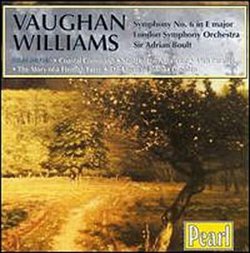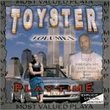| All Artists: Ralph Vaughan Williams, Ernest Irving, Muir Mathieson, London Symphony Orchestra, Philharmonia Orchestra of London Title: Vaughan Williams: Symphony no. 6, Film Music Members Wishing: 0 Total Copies: 0 Label: Pearl Original Release Date: 1/1/1943 Re-Release Date: 9/26/2000 Genres: Jazz, Pop, Soundtracks, Broadway & Vocalists Styles: Traditional Jazz & Ragtime, Vocal Jazz, Bebop, Oldies, Vocal Pop, Traditional Vocal Pop Number of Discs: 1 SwapaCD Credits: 1 UPC: 727031010722 |
Search - Ralph Vaughan Williams, Ernest Irving, Muir Mathieson :: Vaughan Williams: Symphony no. 6, Film Music
 | Ralph Vaughan Williams, Ernest Irving, Muir Mathieson Vaughan Williams: Symphony no. 6, Film Music Genres: Jazz, Pop, Soundtracks, Broadway & Vocalists
|
Larger Image |
CD DetailsSimilar CDs
|
CD ReviewsThe Other Ralph Vaughan Williams Thomas F. Bertonneau | Oswego, NY United States | 10/17/2000 (4 out of 5 stars) "Ralph Vaughan-Williams (1872-1958) composed his Sixth Symphony (E-Major and Minor) in 1946, right after World War II. Those who remembered the Fourth Symphony (F-Minor), from 1934, should not have started at the new score's harshness and dissonance; but the serene Fifth Symphony (D-Minor) had interposed between the Fourth and Sixth, reinforcing the received notion of Vaughan-Williams the gentle pastoralist. So the Sixth, with its eruptive crescendi in the First Movement and malevolent saxophone in the Scherzo, struck its early audiences as shocking, as cynical, and as a resigned editorial on the dim prospects of post-war humanity. The rumor even circulated that the pianissimo Finale, in the form of a slow fugue, represented a world blasted and depopulated by atomic weapons. (RVW denied this and quoted Prospero from "The Tempest": "We are are such stuff as dreams are made on.") Adrian Boult recorded the Sixth in 1949, two years after its première, for EMI, and now Pearl reissues the matrices along with other archival material - all of it film-music - from the same period in the composer's career. Boult would re-record the Sixth at least twice; but the 1949 "take" makes a claim on our interest not only because it uses the composer's first, quickly withdrawn, version of the Scherzo but also because it lies close to the music's inception and thus takes its character from the very Zeitgeist that gave rise to RVW's apocalyptic vision in the first place. Peter Pirie ("The English Musical Renaissance" [1976]) describes this bleak score as "noisy... dramatic [and] powerful." Boult's interpretation brings out the tumultuousness of it, keeping up the tempos where, in later recorded performances, he becomes slightly more expansive, to some small detriment in the tightly wound mood. Boult's Second Movement (Moderato) has something of the quality of "nightmare" that Pirie sees in it. Pirie also notes that certain "effects" in the Sixth "suggest film-music." In fact, RVW would draw his Seventh Symphony from the music that he contributed to the 1948 film "Scott of the Antarctic," a minuscule suite (8.22) from which, conducted by Ernest Irving, we hear next in the program. The disc also gives us brief excerpts from the scores to "Coastal Command," "49th Parallel," "The Story of a Flemish Farm," and "The Loves of Joanna Godden." (The conductor Muir Matheson has a hand in some of this.) The eponymous Symphony better serves the Antarctic music, although this is not to dismiss the playing on these early "soundtrack" platters. The full scores of "Coastal Command" and "The Story of a Flemish Farm" appeared a while back on a Marco Polo CD. The main interest here (and the interest is high) thus lies in the Sixth Symphony."
|

 Track Listings (16) - Disc #1
Track Listings (16) - Disc #1

